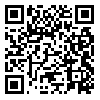Volume 18, Issue 2 (5-2024)
payavard 2024, 18(2): 158-167 |
Back to browse issues page
Ethics code: IR.SKUMS.REC.91-11-19
Download citation:
BibTeX | RIS | EndNote | Medlars | ProCite | Reference Manager | RefWorks
Send citation to:



BibTeX | RIS | EndNote | Medlars | ProCite | Reference Manager | RefWorks
Send citation to:
Shirvani M, Roshanzadeh M, Rabiey Faradonbeh M, Mirzaeian R. Investigating the Effect of Fasting on the Mental Health of Nursing Students. payavard 2024; 18 (2) :158-167
URL: http://payavard.tums.ac.ir/article-1-7717-en.html
URL: http://payavard.tums.ac.ir/article-1-7717-en.html
1- Instructor, Department of Nursing, Borujen School of Medical Sciences, Shahrekord University of Medical Sciences, Shahrekord, Iran
2- Assistant Professor, Department of Nursing, Borujen School of Medical Sciences, Shahrekord University of Medical Sciences, Shahrekord, Iran
3- Master of Science in Aging Health, Borujen School of Medical Sciences, Shahrekord University of Medical Sciences, Shahrekord, Iran
4- Assistant Professor, Department of Health Information Management, School of Allied Medical Sciences, Shahrekord University of Medical Sciences, Shahrekord, Iran ,Mirzaeian.r@skums.ac.ir
2- Assistant Professor, Department of Nursing, Borujen School of Medical Sciences, Shahrekord University of Medical Sciences, Shahrekord, Iran
3- Master of Science in Aging Health, Borujen School of Medical Sciences, Shahrekord University of Medical Sciences, Shahrekord, Iran
4- Assistant Professor, Department of Health Information Management, School of Allied Medical Sciences, Shahrekord University of Medical Sciences, Shahrekord, Iran ,
Abstract: (537 Views)
Background and Aim: Nursing students are exposed to various educational, family, and social stresses and various factors can affect their mental health. Therefore, in order to pay attention to different dimensions of health and investigate the effects of spirituality on health, the present study was conducted to determine the effect of fasting on the mental health of nursing students of Borujen Faculty of Medical Sciences.
Materials and Methods: The present semi-experimental study with a pre-test-post-test design was conducted in 2022 at Shahrekord University of Medical Sciences. Ninety nursing students of Borujen Faculty of Medical Sciences were selected by available methods and assigned to two intervention and control groups by a simple random method. The intervention in this study included at least 23 days of fasting during Ramadan. The data before and after the intervention were collected by the demographic information questionnaire and the 21-question depression, anxiety, and stress standard tool (DASS). The validity and reliability of this questionnaire were conducted for the first time in Iran by Sahebi et al. in 2005. SPSS was used for analysis. Descriptive statistical tests including frequency percentage, mean and standard deviation, and inferential statistical tests including t-test, paired t-test, analysis of variance, and chi-square were used.
Results: There was no significant difference in the total mental health score between intervention (32.32±11.62) and control (29.87±14.09) groups before the intervention (P=0.08). There was a significant difference in this score between intervention (20.6±5.71) and control (29.49±8.9) groups after the intervention (P=0.04). The total mental health score in the control group before (29.87±14.09) and after (29.49±8.9) the intervention had no significant difference (P=0.15); while in the intervention group before (32.32±11.62) and after (20.6±5.71) the intervention had a significant difference (P=0.001). Mental health dimensions before and after intervention, indicated that anxiety (P=0.04) and stress (P=0.003) decreased significantly after the intervention in the intervention group. However, there was no significant difference in the depression dimension (P=0.06).
Conclusion: According to the results, it should be said that regular and periodic examination of the health level, and the promotion of educational and training programs on the subject of fasting to improve mental health, should be considered.
Materials and Methods: The present semi-experimental study with a pre-test-post-test design was conducted in 2022 at Shahrekord University of Medical Sciences. Ninety nursing students of Borujen Faculty of Medical Sciences were selected by available methods and assigned to two intervention and control groups by a simple random method. The intervention in this study included at least 23 days of fasting during Ramadan. The data before and after the intervention were collected by the demographic information questionnaire and the 21-question depression, anxiety, and stress standard tool (DASS). The validity and reliability of this questionnaire were conducted for the first time in Iran by Sahebi et al. in 2005. SPSS was used for analysis. Descriptive statistical tests including frequency percentage, mean and standard deviation, and inferential statistical tests including t-test, paired t-test, analysis of variance, and chi-square were used.
Results: There was no significant difference in the total mental health score between intervention (32.32±11.62) and control (29.87±14.09) groups before the intervention (P=0.08). There was a significant difference in this score between intervention (20.6±5.71) and control (29.49±8.9) groups after the intervention (P=0.04). The total mental health score in the control group before (29.87±14.09) and after (29.49±8.9) the intervention had no significant difference (P=0.15); while in the intervention group before (32.32±11.62) and after (20.6±5.71) the intervention had a significant difference (P=0.001). Mental health dimensions before and after intervention, indicated that anxiety (P=0.04) and stress (P=0.003) decreased significantly after the intervention in the intervention group. However, there was no significant difference in the depression dimension (P=0.06).
Conclusion: According to the results, it should be said that regular and periodic examination of the health level, and the promotion of educational and training programs on the subject of fasting to improve mental health, should be considered.
Send email to the article author
| Rights and permissions | |
 |
This work is licensed under a Creative Commons Attribution-NonCommercial 4.0 International License. |





